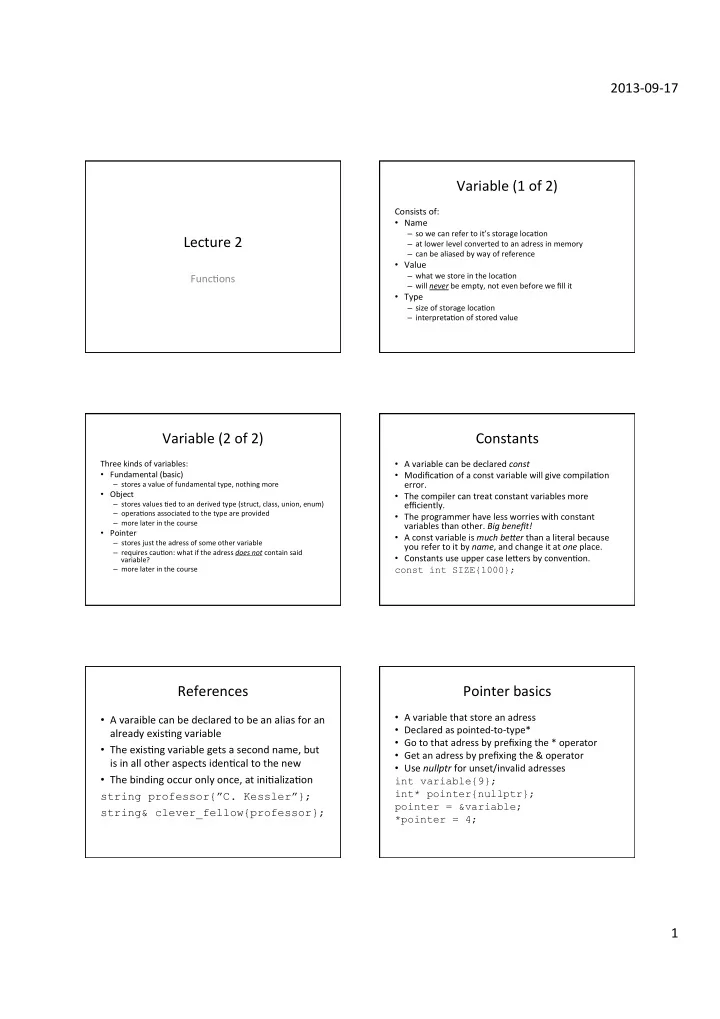

2013-‑09-‑17 ¡ Variable ¡(1 ¡of ¡2) ¡ Consists ¡of: ¡ • Name ¡ – so ¡we ¡can ¡refer ¡to ¡it’s ¡storage ¡loca1on ¡ Lecture ¡2 ¡ – at ¡lower ¡level ¡converted ¡to ¡an ¡adress ¡in ¡memory ¡ – can ¡be ¡aliased ¡by ¡way ¡of ¡reference ¡ • Value ¡ – what ¡we ¡store ¡in ¡the ¡loca1on ¡ Func1ons ¡ – will ¡ never ¡be ¡empty, ¡not ¡even ¡before ¡we ¡fill ¡it ¡ • Type ¡ – size ¡of ¡storage ¡loca1on ¡ – interpreta1on ¡of ¡stored ¡value ¡ Variable ¡(2 ¡of ¡2) ¡ Constants ¡ Three ¡kinds ¡of ¡variables: ¡ • A ¡variable ¡can ¡be ¡declared ¡ const ¡ • Fundamental ¡(basic) ¡ • Modifica1on ¡of ¡a ¡const ¡variable ¡will ¡give ¡compila1on ¡ error. ¡ – stores ¡a ¡value ¡of ¡fundamental ¡type, ¡nothing ¡more ¡ • Object ¡ • The ¡compiler ¡can ¡treat ¡constant ¡variables ¡more ¡ – stores ¡values ¡1ed ¡to ¡an ¡derived ¡type ¡(struct, ¡class, ¡union, ¡enum) ¡ efficiently. ¡ – opera1ons ¡associated ¡to ¡the ¡type ¡are ¡provided ¡ • The ¡programmer ¡have ¡less ¡worries ¡with ¡constant ¡ – more ¡later ¡in ¡the ¡course ¡ variables ¡than ¡other. ¡ Big ¡benefit! ¡ • Pointer ¡ • A ¡const ¡variable ¡is ¡ much ¡be4er ¡than ¡a ¡literal ¡because ¡ – stores ¡just ¡the ¡adress ¡of ¡some ¡other ¡variable ¡ you ¡refer ¡to ¡it ¡by ¡ name , ¡and ¡change ¡it ¡at ¡ one ¡place. ¡ – requires ¡cau1on: ¡what ¡if ¡the ¡adress ¡ does ¡not ¡contain ¡said ¡ • Constants ¡use ¡upper ¡case ¡leVers ¡by ¡conven1on. ¡ variable? ¡ – more ¡later ¡in ¡the ¡course ¡ const int SIZE{1000}; References ¡ Pointer ¡basics ¡ • A ¡variable ¡that ¡store ¡an ¡adress ¡ • A ¡varaible ¡can ¡be ¡declared ¡to ¡be ¡an ¡alias ¡for ¡an ¡ • Declared ¡as ¡pointed-‑to-‑type* ¡ already ¡exis1ng ¡variable ¡ • Go ¡to ¡that ¡adress ¡by ¡prefixing ¡the ¡* ¡operator ¡ • The ¡exis1ng ¡variable ¡gets ¡a ¡second ¡name, ¡but ¡ • Get ¡an ¡adress ¡by ¡prefixing ¡the ¡& ¡operator ¡ is ¡in ¡all ¡other ¡aspects ¡iden1cal ¡to ¡the ¡new ¡ • Use ¡ nullptr ¡for ¡unset/invalid ¡adresses ¡ • The ¡binding ¡occur ¡only ¡once, ¡at ¡ini1aliza1on ¡ int variable{9}; int* pointer{nullptr}; string professor{”C. Kessler”}; pointer = &variable; string& clever_fellow{professor}; *pointer = 4; 1 ¡
2013-‑09-‑17 ¡ Sequence ¡and ¡block ¡ Func1on ¡(1 ¡of ¡3) ¡ • A ¡sequen1al ¡list ¡of ¡statements ¡ • A ¡block ¡that ¡has ¡been ¡given ¡a ¡name ¡ • Can ¡be ¡executed ¡(called) ¡by ¡wri1ng ¡it’s ¡name ¡in ¡other ¡parts ¡ • Each ¡statement ¡is ¡terminated ¡with ¡a ¡semicolon ¡ of ¡the ¡program, ¡ provide ¡reusable ¡code ¡ • All ¡statements ¡are ¡inside ¡some ¡block ¡ • Can ¡accept ¡input ¡(parameters) ¡from ¡calling ¡code ¡ • En1re ¡block ¡form ¡a ¡compound ¡statement ¡ • Can ¡give ¡(return) ¡a ¡result ¡back ¡to ¡calling ¡code ¡ • Statements ¡are ¡executed ¡one ¡by ¡one ¡in ¡order: ¡ return-type function-name (parameter-list) { // beginning of block { statement1; statement1; statement2; statement2; statement3; return expression; } } // end of block Func1on ¡(2 ¡of ¡3) ¡ Func1on ¡(3 ¡of ¡3) ¡ A ¡func1on ¡must ¡have ¡a ¡single ¡well ¡defined ¡task. ¡No ¡side ¡effects! ¡ • Mul1purposed ¡func1ons ¡are ¡hard ¡to ¡reuse. ¡ • • Func1on ¡name ¡should ¡be ¡well ¡choosen. ¡ • Func1ons ¡with ¡sid ¡effects ¡are ¡hard ¡to ¡reuse. ¡ • The ¡purpose, ¡inputs, ¡and ¡result ¡must ¡be ¡documented ¡in ¡a ¡comment ¡before ¡ • Ocen ¡seen ¡in ¡student ¡code. ¡ BAD, ¡BAD, ¡Threefold ¡BAD . ¡ the ¡func1on. ¡Also ¡document ¡any ¡assump1ons, ¡presump1ons ¡or ¡special ¡ considera1ons. // BAD BAD BAD (oh well.. ;-) // purpose: calculate sum of love // inputs: integers a, b // You can’t have one without the other!!! // output: the sum of love (integer) void love_and_marriage(int a, int b) int love(int a, int b) { return a + b; } { // purpose: print v on stdout cout << a + b << endl; void marriage(int v) { cout << v << endl; } } marriage(love(a,b)); // GOOD, individually reusable functions love_and_marriage(a, b); // can’t do just love!!!! // what’s wrong above? Func1on ¡types ¡ Func1on ¡declara1on ¡and ¡defini1on ¡ • The ¡return-‑type, ¡func1on-‑name ¡and ¡ • A ¡func1on ¡with ¡no ¡return ¡value ¡is ¡ocen ¡called ¡ parameter-‑list ¡followed ¡by ¡a ¡semicolon ¡is ¡a ¡ a ¡ subrou=ne ¡or ¡a ¡ procedure ¡ declara1on. ¡ • A ¡func1on ¡part ¡of ¡an ¡object ¡variable ¡is ¡ocen ¡ • If ¡you ¡specify ¡the ¡en1re ¡func1on ¡body ¡(block) ¡ called ¡a ¡ member ¡func=on ¡or ¡a ¡ method ¡ instead ¡of ¡semicolon ¡it ¡is ¡a ¡defini1on. ¡ • A ¡func1on ¡created ¡inline, ¡or ¡”on ¡the ¡fly” ¡is ¡ • Declara1on ¡ called ¡a ¡ lambda ¡func=on ¡ – Tells ¡the ¡compiler ¡the ¡func1on ¡exists ¡somewhere. ¡ • An ¡object ¡possible ¡to ¡call ¡as ¡a ¡func1on ¡is ¡called ¡ • Defini1on ¡ a ¡ func=on ¡object , ¡and ¡have ¡operator() ¡defined ¡ – Places ¡func1on ¡code ¡in ¡program ¡memory. ¡ 2 ¡
Recommend
More recommend